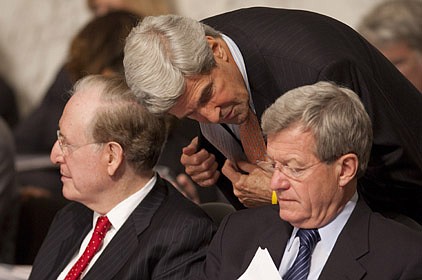WASHINGTON — The Senate Finance Committee voted down the creation of government-run health insurance to compete with private company plans on Tuesday, handing the Obama administration a setback on one of its key planks in the broader health-care debate.
Arkansas' Sen. Blanche Lincoln, Democrat who sits on the committee, voted against a government plan.
Under a federal plan, she said, the government would likely end up covering people with health problems, while private companies would likely cover healthier people.
"The private industry's walking away with all the assets, and the government ends up holding all the risk," she said.
Lincoln said her goal in crafting health-care legislation was to lower prices, improve the quality of care and increase choices for consumers.
"You can do all that without creating a new government program ... that in the long run we're not going to be able to afford."
Though the so-called public option was rejected by the committee, it is likely to be brought up if legislation reaches the Senate floor, and in the House, where it enjoys strong support from Democratic leadership.
President Barack Obama listed the public option as a top priority when he addressed a joint session of Congress on Sept. 9.
He told lawmakers that a public plan would be self-sufficient, relying on premiums that it collects, and "by avoiding some of the overhead that gets eaten up by private companies by profits, excessive administrative costs and executive salaries, it could provide a good deal for consumers."
During debate in committee Tuesday, its fifth day of deliberations on the matter, West Virginia's Sen. Jay Rockefeller, author of one of two public option amendments considered by the panel, said his plan would inject more competition into what he considers a "rapacious" insurance industry.
"The insurance companies, in my judgment, are determined to protect their profits and put their customers second," the Democrat said.
Opponents of a government plan countered that it would force private insurers to compete on an uneven playing field.
A public option, said Utah Republican Sen. Orrin Hatch, is "nothing but a Trojan horse for a single-payer system," a system that has been likened to providing Medicare coverage for everybody.
Iowa's Sen. Chuck Grassley, the ranking Republican on the committee agreed with Hatch.
"It's a slow walk towards government-controlled, single-payer health care," he said. "A government-run plan will ultimately force private insurers out of business."
Rockefeller's amendment also would have set reimbursement rates to doctors and hospitals at the level set under the federal Medicare program. After two years, price negotiations would be allowed.
The other amendment considered by the panel was offered by New York's Democratic Sen. Charles Schumer. It would have called for prices to be negotiated immediately.
Rockefeller's language lost on a 15-8 vote, with Lincoln joining four other Democrats who voted no. Schumer's provision lost on a 13-10 vote. Lincoln, Committee Chairman Max Baucus of Montana and Sen. Kent Conrad of North Dakota were the only Democrats who voted against it. The committee's 10 Republicans unanimously rejected both proposals.
Supporters of a government-run plan said it would result in lower prices and more coverage of people currently without insurance.
"People assume that it's some kind of government takeover," Rockefeller said. "Those are mostly people that have an ideological bent against it, and it isn't. It's optional." He said that insurance company premiums had doubled since 2001, while their profits had increased 400 percent during the same timeperiod.
Later in the debate over his amendment, Rockefeller asked Yvette Fontenot, a committee staff member, about the "state of competitiveness" in the insurance industry.
Fontenot replied that according to a 2007 American Medical Association study, the top two providers held large market shares in a number of states, including Arkansas, where the top two competitors hold 81 percent of the market.
Later in the hearing, Schumer said "there was very little competition" among insurers.
"The American way is to bring in more competition," he said.
Grassley countered that a public plan would put private insurers in jeopardy, especially in rural parts of the country.
Doctors in those areas, he said, are reimbursed for 80 percent of their costs under the Medicare program that provides health care for the elderly.
If a larger public plan were created, with similar reimbursement rules set in an attempt to control costs, he said, doctors would try to make up for that by charging private plans more.
"As the government plan grows and shifts more and more costs to the privateplans, the price differential will increase and make [the] public plan increasingly the only viable option."
Lincoln has spoken favorably about one policy choice, the creation of "co-ops," which are plans owned by policyholders, as a way to reduce costs, but cautioned that she wanted to see how things progress in committee hearings that are expected to last for the rest of the week.
"This is a big puzzle," she said. "If you put a piece of a puzzle in the wrong place, the whole thing doesn't fit."
In addition to the healthcare votes, the Finance Committee also voted 12-11 to restore $50 million in federal funding for abstinence-only sex education that Obama hadsought to eliminate.
Democrats Lincoln and Conrad voted along with all 10 Republicans to back the abstinence-only program.
Information for this article was contributed by The Associated Press.
Front Section, Pages 1, 7 on 09/30/2009

